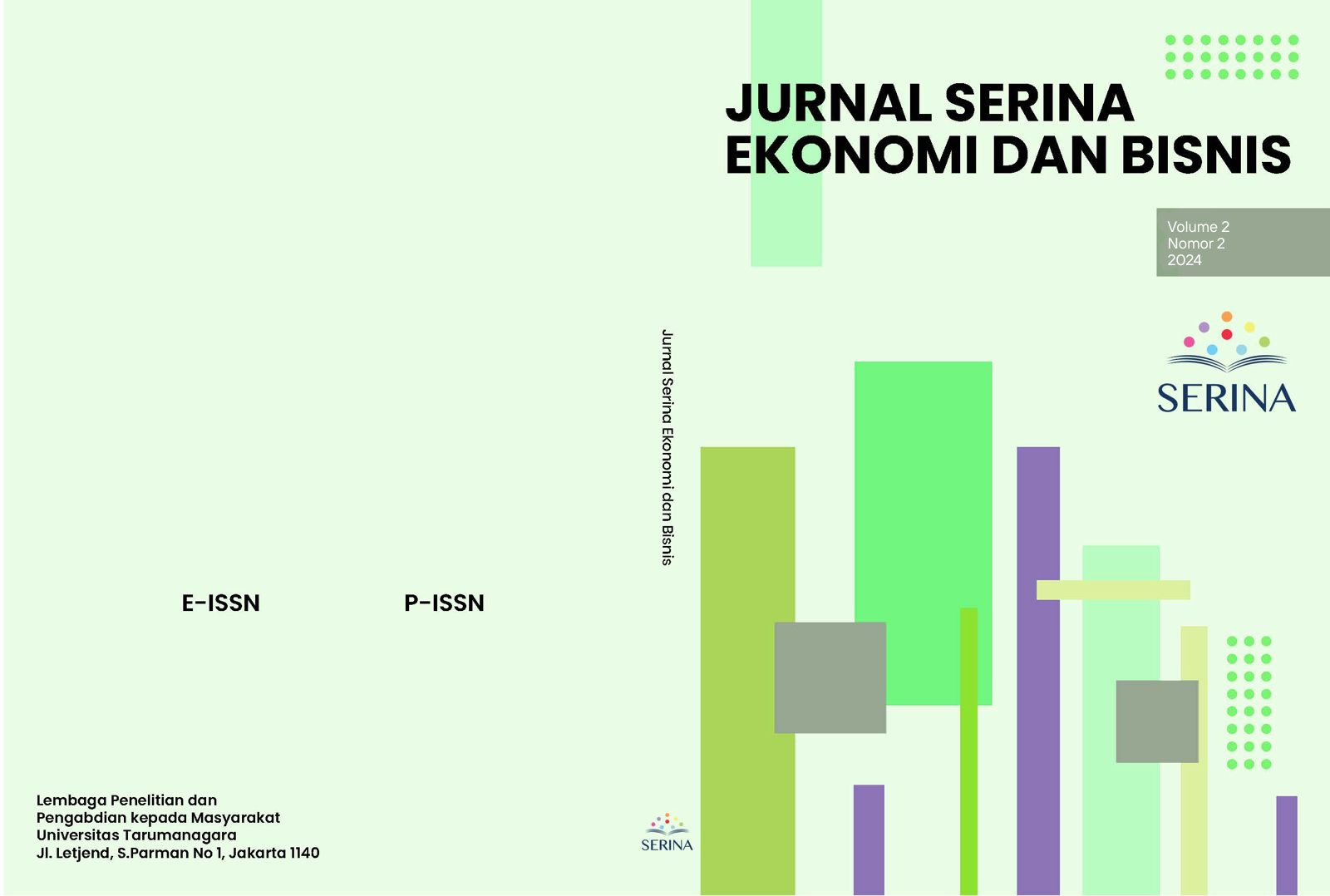PENGARUH ATTITUDE, SUBJECTIVE NORM, PERCEIVED BEHAVIORAL CONTROL DAN PERCEIVED UNIVERSITY SUPPORT TERHADAP ENTREPRENEURIAL INTENTION
Main Article Content
Abstract
Indonesia membutuhkan lebih banyak wirausaha untuk mencapai status negara maju, namun hanya 3,4% pengusaha muda saat ini. Dibanding negara tetangga, Indonesia tertinggal jauh. Berbagai upaya, seperti program pemerintah dan dukungan universitas, dilakukan untuk meningkatkan minat berwirausaha, khususnya di kalangan mahasiswa yang dianggap agent of change. Penelitian ini bertujuan untuk menganalisis peran attitude, subjective norm, perceived behavioral control dan perceived university support terhadap entrepreneurial intention pada Mahasiswa di Jakarta. Penelitian ini menggunakan pendekatan kuantitatif. Hasil penelitian ini Attitude secara positif memiliki pengaruh yang signifikan terhadap entrepreneurial intention, Subjective norm tidak memiliki pengaruh yang signifikan terhadap entrepreneurial intention, Perceived behavioral control tidak memiliki pengaruh yang signifikan terhadap entrepreneurial intention dan Perceived university support secara positif memiliki pengaruh yang signifikan terhadap entrepreneurial intention.
Indonesia needs more entrepreneurs to achieve developed country status, yet only 3.4% of young entrepreneurs currently exist. Compared to neighboring countries, Indonesia is far behind. Various efforts, such as government programs and university support, are made to increase interest in entrepreneurship, especially among students who are considered agents of change. This study aims to analyze the role of attitude, subjective norm, perceived behavioral control and perceived university support on entrepreneurial intention in students in Jakarta. This research uses a quantitative approach. The results of this study Attitude positively has a significant effect on entrepreneurial intention, Subjective norm does not have a significant effect on entrepreneurial intention, Perceived behavioral control does not have a significant effect on entrepreneurial intention and Perceived university support positively has a significant effect on entrepreneurial intention.
Article Details

This work is licensed under a Creative Commons Attribution-NonCommercial-ShareAlike 4.0 International License.
References
Ajzen, I. (1991). The Theory of Planned Behavior. Organizational Behavior and Human Decision Processes, 50(1), 179–211. https://doi.org/10.47985/dcidj.475
Atmaja, K. R. S. (2019). Pengaruh Attitude Towards Behavior, Subjective Norms, Dan Perceived Behavior Control Terhadap Entrepreneurial Intention Mahasiswa Uc Jurusan Ibm-Rc Angkatan 2016.
Ayi Syabani, Dwi Retno Utari, & Fazar Nuriansyah. (2024). Pengaruh Attitude Towards Entrepreneurship, Subjective Norms, dan Perceived Behavioural Control terhadap Intensi Berwirausaha. Edunomic Jurnal Pendidikan Ekonomi, 12(1), 57–65. https://doi.org/10.33603/ejpe.v12i1.38
Carina, T., Wibawa, I. W. S., & Yani, N. W. M. N. (2024). Peran Moderasi Perceived University Support dalam Pengaruh Proactive Personality terhadap Entrepreneurial Intention. Jurnal Ilmiah Manajemen, Ekonomi, & Akuntansi (MEA), 8(1), 274–289. https://doi.org/10.31955/mea.v8i1.3668
CNBC Indonesia. (2022). Jumlah Entrepreneur RI Cuma 3,4% Dari Populasi, Masih Kurang! Tim Redaksi. https://www.cnbcindonesia.com/entrepreneur/20220318173957-25-324038/jumlah-entrepreneur-ri-cuma-34-dari-populasi-masih-kurang
Goodstats. (2023). Terus Meningkat, Jumlah Wirausaha Pemuda Indonesia Mencapai 19%. https://goodstats.id/article/terus-meningkat-jumlah-wirausaha-pemuda-indonesia-mencapai-19-persen-97TOM
Hansfel, L., & Puspitowati, I. (2020). Pengaruh Attitude, Subjective Norm dan Perceived Behavior Control terhadap Entrepreneurial Intention. Jurnal Manajerial Dan Kewirausahaan, 2(4), 985. https://doi.org/10.24912/jmk.v2i4.9881
Henderson, R., & Robertson, M. (2000). Career Development International Emerald Article : Who wants to be an entrepreneur ? Young Adult Attitudes to Entrepreneurship as a Career Who Wants To Be An Entrepreneur ? Young Adult Attitudes to Entrepreneurship as a Career. Career Development International, 5(6), 279–287.
Krueger, N. F., Reilly, M. D., & Carsrud, A. L. (2000). Competing models of entrepreneurial intentions. Journal of Business Venturing, 15(5), 411–432. https://doi.org/10.1016/S0883-9026(98)00033-0
Miranda, F. J., Chamorro-Mera, A., & Rubio, S. (2017). Academic Entrepreneurship In Spanish Universities: An Analysis of the Determinants of Entrepreneurial Intention. European Research on Management and Business Economics, 23(2), 113–122. https://doi.org/10.1016/j.iedeen.2017.01.001
Prawira, J. J., & Hidayah, N. (2021). Pengaruh Subjective Norm, Attitude Toward Behavior, Dan Self-Efficacy Terhadap Entrepreneurial Intention. Jurnal Manajerial Dan Kewirausahaan, 3(3), 762. https://doi.org/10.24912/jmk.v3i3.13208
Primandaru, N., & Adriyani, B. (2019). Pengaruh Entrepreneurial Education, Risk Tolerance dan Self Efficacy terhadap Entrepreneurial Intention Pada Mahasiswa. Jurnal Bisnis & Manajemen, 19(1), 11–24.
Shi, Y., Yuan, T., Bell, R., & Wang, J. (2020). Investigating the Relationship Between Creativity and Entrepreneurial Intention: The Moderating Role of Creativity in the Theory of Planned Behavior. Frontiers in Psychology, 11(June), 1–12. https://doi.org/10.3389/fpsyg.2020.01209
Siaputra, H., & Isaac, E. (2020). Pengaruh Attitude, Subjective Norm, dan Perceived Behavior Control terhadap Purchase Intention Makanan Sehat Di Crunchaus Surabaya. Jurnal Manajemen Perhotelan, 6(1), 9–18. https://doi.org/10.9744/jmp.6.1.9-18
Su, Y., Zhu, Z., Chen, J., Jin, Y., Wang, T., Lin, C.-L., & Xu, D. (2021). Factors Influencing Entrepreneurial Intention of University Students in China: Integrating the Perceived University Support and Theory Of Plannhu, Zeren Chen, Jingwen Jin, Yuanqing Wang, Ting Lin, Chien Liang Xu, Danyinged behavior. Sustainability (Switzerland), 13(8), 1–17.
Sulistiawan, J. (2016). Pengaruh Perceived Support, Fear Of Failure Dan Self-Efficacy Terhadap Niat Berwirausaha Pada Mahasiswa S1 Manajemen Fakultas Ekonomi Dan Bisnis Universitas Airlangga. Jurnal Manajemen Teori Dan Terapan| Journal of Theory and Applied Management, 9(1), 50–57. https://doi.org/10.20473/jmtt.v9i1.2786
Suryawirawan, O. A., Shabrie, W. S., & Cahyono, K. E. (2021). Implementasi Theory of Planned Behavior terhadap Entrepreneurial Intention: Efek Moderasi Entrepreneurship Education dan Gender. Jurnal Manajemen Dan Kewirausahaan, 9(2), 207–221. https://doi.org/10.26905/jmdk.v9i2.6367
Tulipa, D., Sancoko, A. H., & Rahmawati, V. (2024). Peran Perceived Desirability Dalam Memediasi Hubungan Antara Attitude Dengan Entrepreneurial Intention. Media Mahardhika, 22(3), 365–376. https://doi.org/10.29062/mahardika.v22i3.917
Tutik, T. T. (2020). Peran Mahasiswa Sebagai Social Control Dan Agent of Change Dalam Kehidupan Berbangsa.
Xevinkeng, X., & Layman, C. V. (2022). Do University Support, Entrepreneurial Attitudes, Subjective Norms, and Self-Efficacy Influence Student Entrepreneurial Intention? Ultima Management : Jurnal Ilmu Manajemen, 14(1), 39–59. https://doi.org/10.31937/manajemen.v14i1.2499



